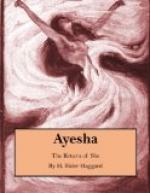For the rest, should human eyes ever fall upon it, each reader must form his own opinion of this history, its true interpretation and significance. These and the exact parts played by Atene and myself in its development I hope to solve shortly, though not here.
Well, as I have said, the upshot of it all was that Ayesha was devoured with anxiety about Leo. Except in this matter of marriage, his every wish was satisfied, and indeed forestalled. Thus he was never again asked to share in any of the ceremonies of the Sanctuary, though, indeed, stripped of its rites and spiritual symbols, the religion of the College of Hes proved pure and harmless enough. It was but a diluted version of the Osiris and Isis worship of old Egypt, from which it had been inherited, mixed with the Central Asian belief in the transmigration or reincarnation of souls and the possibility of drawing near to the ultimate Godhead by holiness of thought and life.
In fact, the head priestess and Oracle was only worshipped as a representative of the Divinity, while the temporal aims of the College in practice were confined to good works, although it is true that they still sighed for their lost authority over the country of Kaloon. Thus they had hospitals, and during the long and severe winters, when the Tribes of the Mountain slopes were often driven to the verge of starvation, gave liberally to the destitute from their stores of food.
Leo liked to be with Ayesha continually, so we spent each evening in her company, and much of the day also, until she found that this inactivity told upon him who for years had been accustomed to endure every rigour of climate in the open air. After this came home to her—although she was always haunted by terror lest any accident should befall him—Ayesha insisted upon his going out to kill the wild sheep and the ibex, which lived in numbers on the mountain ridges, placing him in the charge of the chiefs and huntsmen of the Tribes, with whom thus he became well acquainted. In this exercise, however, I accompanied him but rarely, as, if used too much, my arm still gave me pain.
Once indeed such an accident did happen. I was seated in the garden with Ayesha and watching her. Her head rested on her hand, and she was looking with her wide eyes, across which the swift thoughts passed like clouds over a windy sky, or dreams through the mind of a sleeper—looking out vacantly towards the mountain snows. Seen thus her loveliness was inexpressible, amazing; merely to gaze upon it was an intoxication. Contemplating it, I understood indeed that, like to that of the fabled Helen, this gift of hers alone—and it was but one of many—must have caused infinite sorrows, had she ever been permitted to display it to the world. It would have driven humanity to madness: the men with longings and the women with jealousy and hate.




